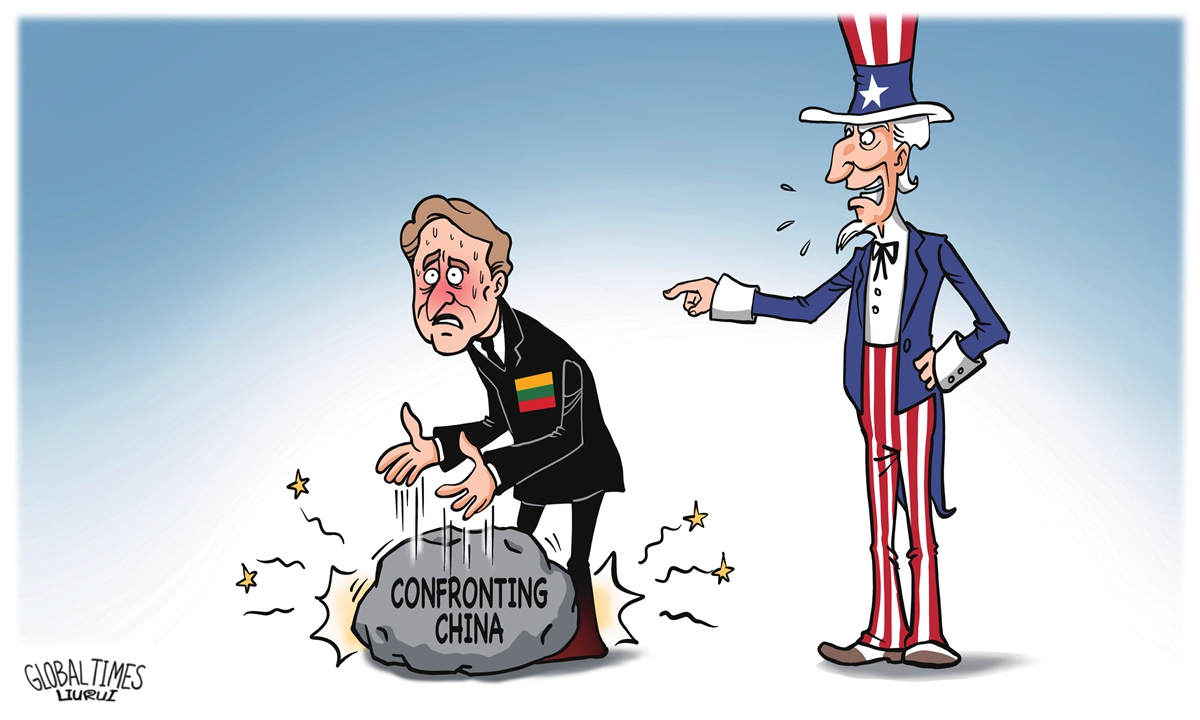
Illustration: Liu Rui/GT
US diplomats have suggested Lithuania consider changing the name of the "Taiwan representative office" in Vilnius, the Financial Times reported, citing several people familiar with the situation. But the report also said both the White House and the Lithuanian foreign ministry denied the US had done so.
The representative office with the name "Taiwan" in Vilnius clearly challenges the one-China principle and grossly interferes in China's internal affairs.
Although the authenticity of the name-changing news remains unclear, it, to some extent, indicates that the US is evaluating this incident and its possible subsequent impact. Some US political elites are worried that this incident may give the Chinese mainland stronger basis to further contain Taiwan secessionists in the international society.
Lithuania's politicians are not on the same page as their government. Some top officials in Lithuania, including President Gitanas Nauseda, admitted that Lithuania made a mistake by allowing Taiwan to open the office in Vilnius, and Lithuania's shadow cabinet reportedly issued a statement that said it hopes Lithuania-China relations can be normalized, and expects the Lithuanian government to redress its mistakes and rename the "Taiwanese representative office" into "Taipei representative office."
But if Lithuania intends to mend its ties with China, it will take much more than just renaming the office. Lithuania has changed its China policy for a while. For example, Vilnius announced in May 2021 that it would withdraw from the 17+1 cooperation mechanism between China and Central and Eastern Europe Countries.
The current Lithuanian government is totally following the lead of the US when it comes to China policy. The name of "Taiwan office" is just a prominent example, and the root cause lies in that its own cognition toward China has changed.
Against this backdrop, the China-Lithuania relations will not return to normal even if Lithuania renames the office. The key is whether the Lithuanian government can clearly recognize the reality. Lithuania needs to make substantial adjustments to its overall China policy, rather than completely follow the US' agenda.
Many analysts across the international community believe that Lithuania's provocations of China have been instigated by Washington. When Lithuania agreed to name the office under "Taiwan" and the Chinese mainland took countermeasures as response, the US obviously hoped to exploit this incident and stir up a wave of anti-China sentiment, in order to intensify its so-called "China coercion" theory and boost its campaign against China. This explains why US said it backs Lithuania.
But when the incident develops into a situation that may impact the US' national interests, Washington would push Lithuania to change direction, entirely based on the interests of the US itself. In other words, when the US' allies or partners lose their values to be exploited or impair the US, the US will discard them. This has been proven many times. The US' withdrawal from Afghanistan is a recent prominent example. This fully demonstrates the hypocrisy and unreliability of the US.
It further reveals that the US pursues double standards regarding its foreign policy. For US, allies are just pawns to serve its own interests or ambition. Lines like "support" is just rhetoric, and US' allies should remain vigilant .
The author is an associate research fellow at the China Institute of International Studies. opinion@globaltimes.com.cn




